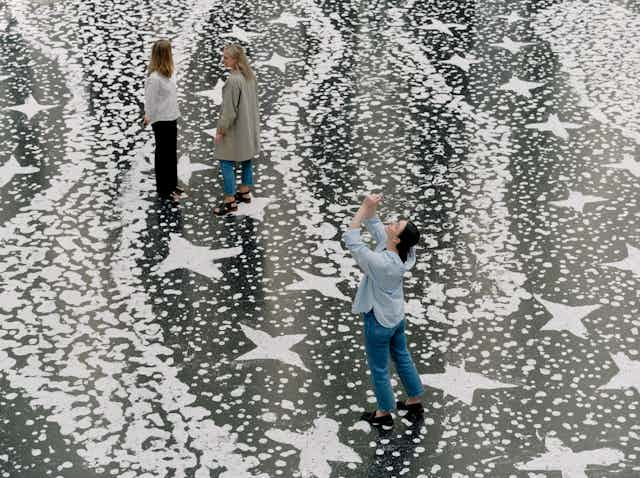Review: Bark Ladies: Eleven artists from Yirrkala, NGV International
Aboriginal and Torres Strait Islander readers are advised this story includes names of people who have died.
Bark painting in Yirrkala is a tradition of some antiquity, but it is also one that constantly reinvents itself.
Although traditionally Yolŋu bark paintings and larrakitj (painted hollow poles) belonged in the male domain, by about 1970 the first women artists turned to these art forms. In 1990, the National Gallery of Victoria acquired its first bark painting by a Yolŋu woman artist, Nancy Gaymala Yunupiŋu’s Bäru story (1990), and over the next three decades it has built up one of the most significant collections of work by Yolŋu women artists in the world.
In recent years, many of these women artists have attained national and international reputations, have been awarded various prizes, and have been the subject of major survey exhibitions in public art galleries.
The show, as one has grown to expect from this gallery, is simply spectacular – dazzling, innovative and very beautiful. As you enter the NGV, the entire entrance foyer is occupied by a huge floor-based installation, Naminapu Maymuru-White’s Milŋiyawuy, (the Milky Way or River of Stars) where the souls of the deceased are turned into stars.
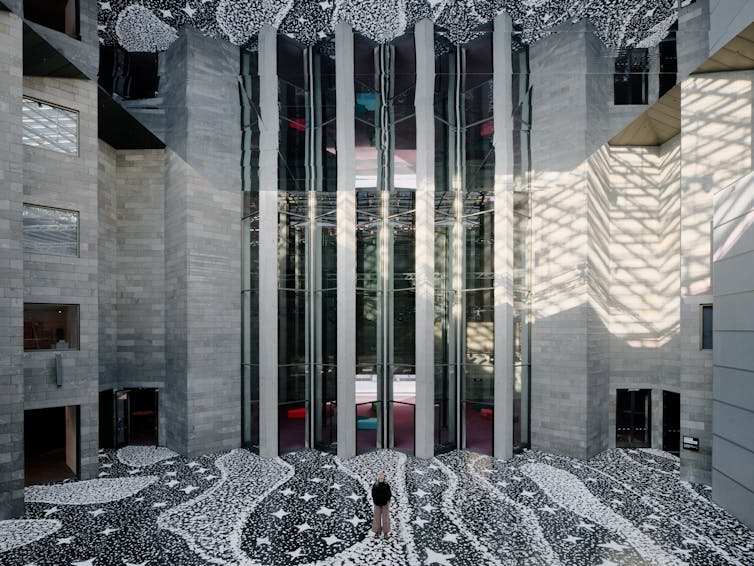
This vast expanse of stars painted in white on the black floor is reflected above in a huge mirror so that the visitor is caught physically suspended between heaven and earth. This sets the mood for the whole exhibition as we negotiate a liminal space that lies somewhere between different spheres of being.
Strong personalities
Each of the 11 women artists included in this exhibition has their own personal imagery and individual stylistic orientation and, in this, it is an exhibition of strong artistic personalities. Although generalisations may be foolhardy, my impression is that the women artists appear less constricted by the binds of convention and more prepared to follow personal trajectories than their male counterparts.
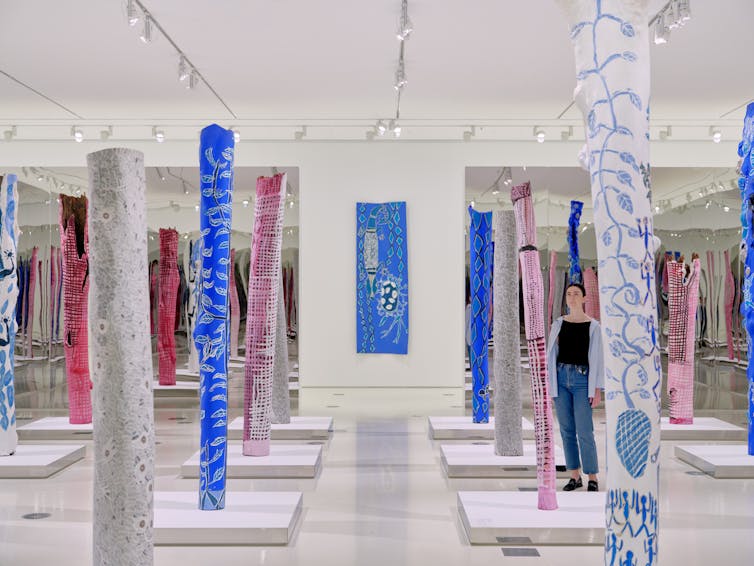
Dhambit Munuŋgurr – the blue lady – was badly injured in a car accident in 2005 and in view of her disability was given permission by the community not to gather and grind her own natural pigments but could use commercial acrylic paints.
She works almost exclusively in blue. On her cardboard palette, she has her colours divided into what she terms: “water blue, midnight blue, cobalt blue, ultramarine, Australian blue and Australian sky blue”.
Her bark paintings and larrakitj formed a highlight in the recent NGV Triennial.
Read more: Enthralling, dystopian, sublime: NGV Triennial has a huge 'wow' factor
In this exhibition, in a striking recent painting titled Order (2021), she has tackled contemporary and topical imagery. The curator of the exhibition, Myles Russell Cook, decodes in his catalogue essay the imagery of this painting. It is a portrait of Julia Gillard, the former Australian prime minister, delivering her misogyny speech “surrounded by limp-faced, unnamed, seated politicians. Yolŋu people appear in the bottom left of the composition, storming the parliament in ceremony dancing with spears”.
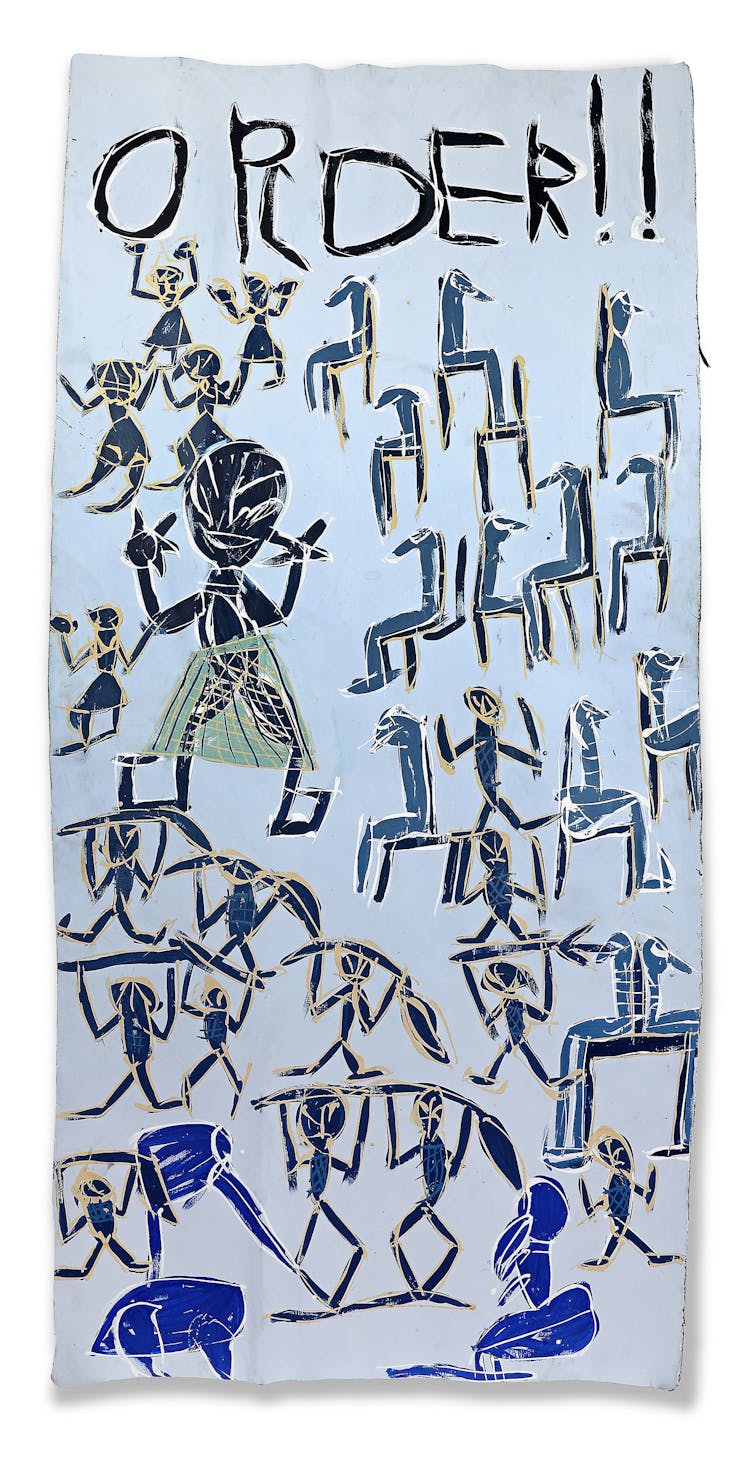
There is a vibrancy, chromatic richness and intensity in the painting as there is in much of Munuŋgurr’s oeuvre.
The much-celebrated Mulkun Wirrpanda, who last year passed from this life, devoted much of her art to preserving traditional knowledge concerning less well-known aspects of bush tucker and passing this on to future generations. The series of her painted barks titled Ŋäḏi ga Guṉdirr have a wonderful solemn majesty and crisp resolution.
As with many artists in this exhibition, there is a confidence and certainty of touch where through her striking designs she reveals her encoded wisdom.
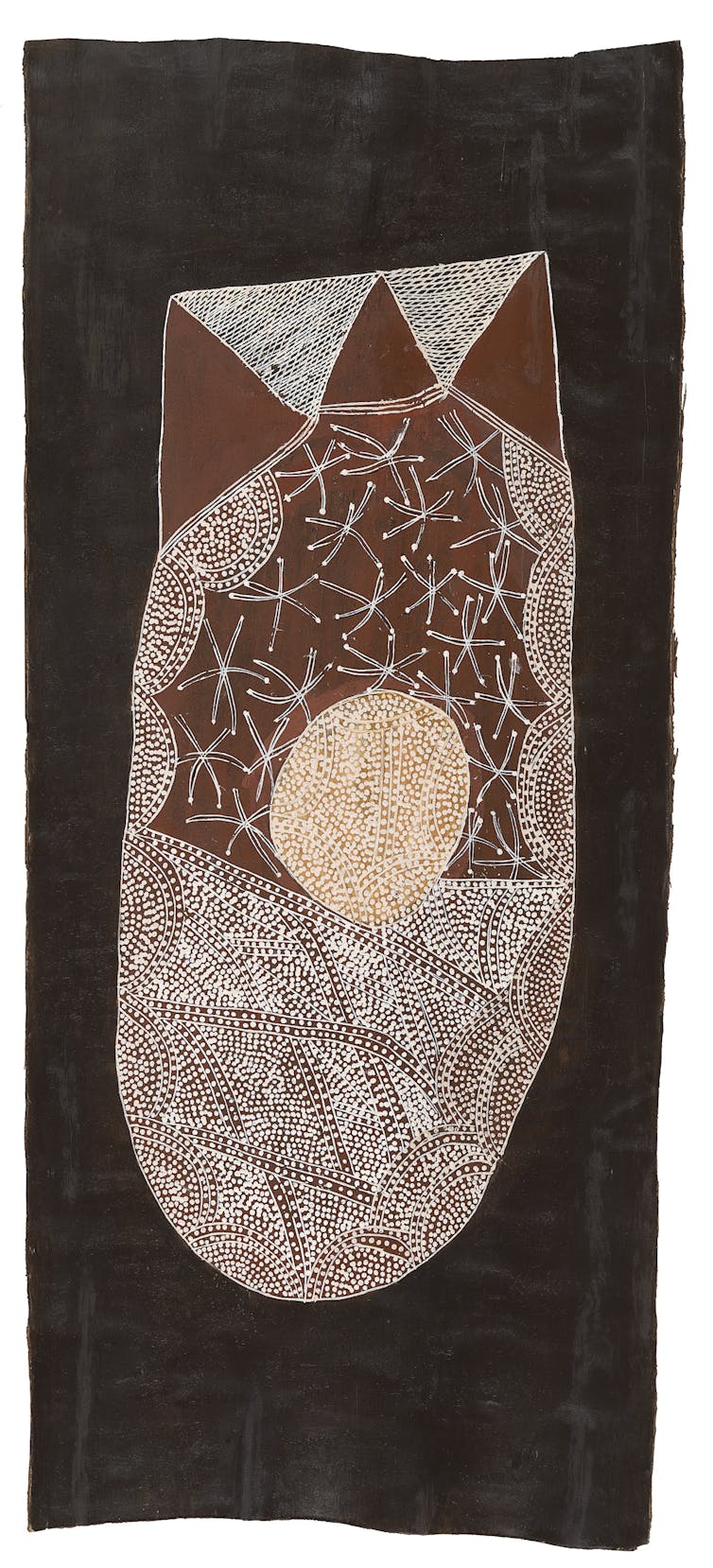
Dhuwarrwarr Marika’s Birth of a Nation is a shimmering installation consisting of six huge bark paintings and five larrakitj that carry the Rirratjiŋu miny’tji design and relate to the landing site of the Djang’kawu Sisters, the major creator beings.
As you stand in front of this installation there is the sensation of being transported onto a different plain of existence. Other works are surrounded by walls of mirrors constantly reminding us of the spiritual and non-earthly frame of reference for much of this art.
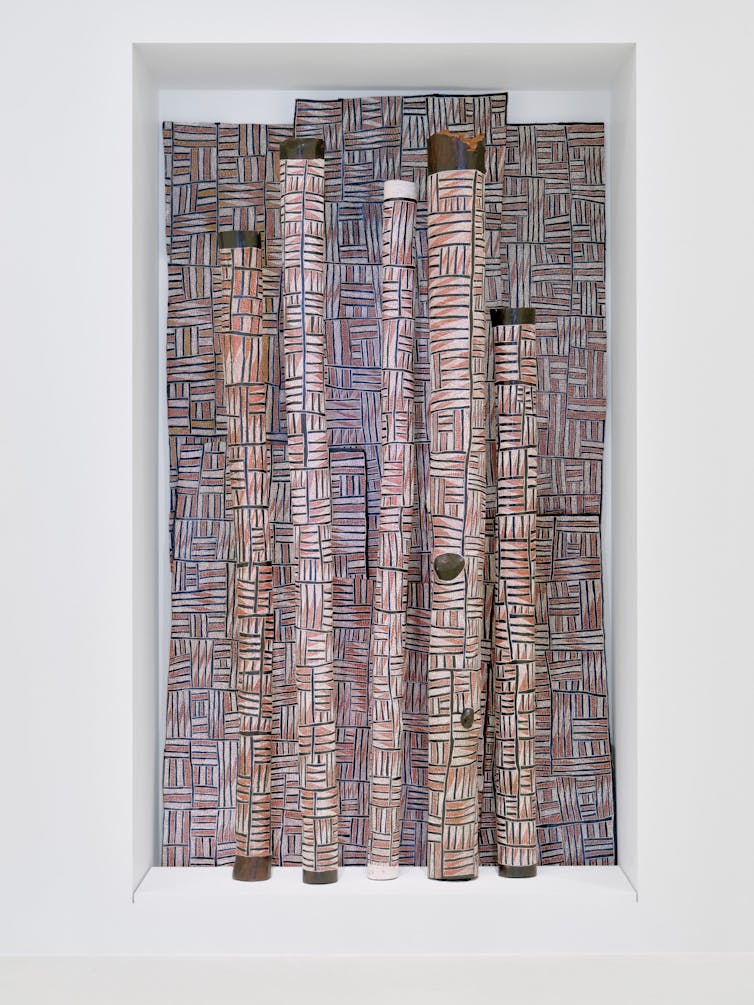
Transported from the gallery
There is always a challenge when displaying Yolŋu art to break from the conventions of the inappropriate white cube gallery and to create a new viewing experience where the audience will feel transported far from the terrestrial realm. In this exhibition, there is as much symbolism in the display with physically dissolving gallery walls, painted floors and numerous reflecting surfaces as there is in the art itself.
Possibly the most unexpected and quirky exhibitor is Eunice Djerrkŋu Yunupiŋu with her bark paintings titled I am a Mermaid (2020), New Generation (2021) and My Wedding (2021).
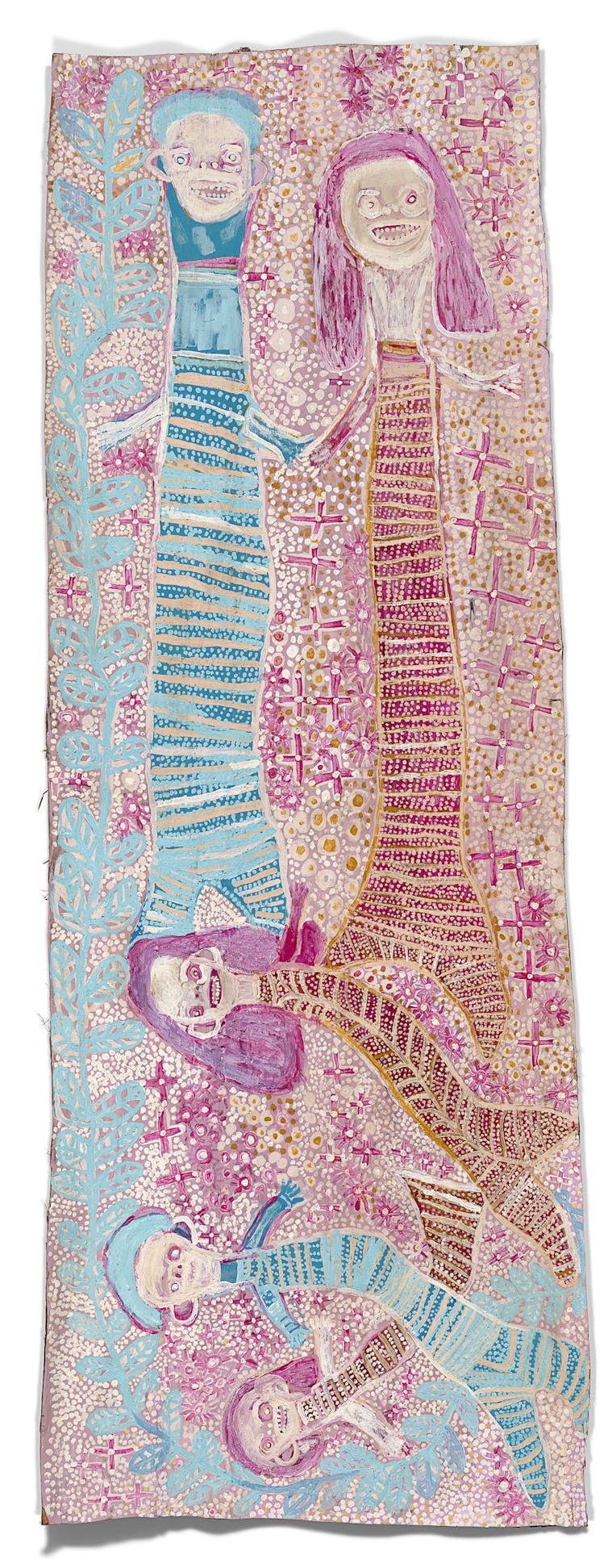
They are painted in a mixture of earth pigments and recycled print toner with the unexpected combination of pinks and greens. The artist’s father once speared a fish that bled human blood and in a dream he was visited by a mermaid who revealed to him that his wife was with child. His daughter came into this world with the knowledge that she was a mermaid. This and other imagery could keep a whole generation of Freudian psychologists employed for years!
The Bark Ladies exhibition is provocative, absorbing and inspirational – as well as a lot of fun.
Bark Ladies shows at NGV International until April 25.

